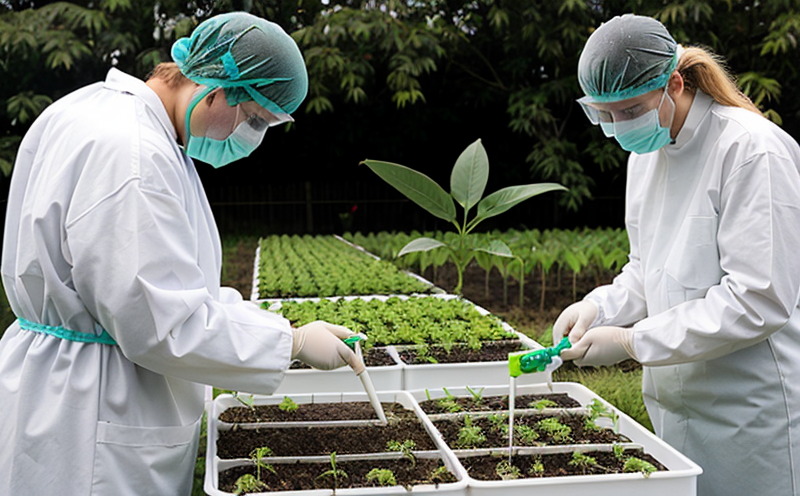Cowpea Mosaic Virus Testing
The Cowpea Mosaic Virus (CPMV) is a significant pathogen affecting leguminous plants, particularly cowpeas and other members of the Fabaceae family. In agricultural sectors, this virus can cause substantial yield losses, leading to economic impacts and reduced food security. This testing service focuses on identifying CPMV in cowpea crops using advanced molecular diagnostic techniques.
The importance of CPMV testing cannot be overstated for quality managers and compliance officers. Accurate detection helps ensure the production of safe and high-quality agricultural products, which is critical for both domestic consumption and international trade. For R&D engineers and procurement specialists, this service provides insights into potential disease outbreaks, enabling proactive measures to minimize economic losses.
Our testing process begins with specimen preparation, where cowpea leaves or other plant parts suspected of being infected are collected. These samples undergo rigorous extraction procedures to isolate viral nucleic acids. The detection method primarily utilizes reverse transcription-polymerase chain reaction (RT-PCR), a highly sensitive and specific technique that amplifies the target virus’s genetic material.
Once the PCR products are generated, they are analyzed using agarose gel electrophoresis or real-time qPCR technology to confirm the presence of CPMV. The results are reported promptly, providing actionable insights for stakeholders involved in agricultural production and supply chain management. This service not only aids in immediate mitigation strategies but also contributes to broader research efforts aimed at understanding and combating viral diseases.
The accuracy and reliability of our testing methods ensure compliance with international standards such as ISO 15143-2, which sets guidelines for the identification of plant viruses using RT-PCR. By adhering to these standards, we provide a robust foundation for decision-making processes within agricultural operations.
- Enhanced crop quality and yield
- Avoidance of economic losses due to disease outbreaks
- Support for regulatory compliance in international trade
- Facilitation of research into plant pathology and virus control strategies
In conclusion, our Cowpea Mosaic Virus Testing service is a vital tool for maintaining the health and productivity of agricultural crops. By leveraging cutting-edge molecular biology techniques, we offer precise and reliable results that are essential for ensuring food safety and agricultural sustainability.
Scope and Methodology
The scope of our Cowpea Mosaic Virus Testing service encompasses the entire process from sample collection to result delivery. Specimens collected include leaves, stems, or any other plant parts showing symptoms indicative of CPMV infection. These samples are transported to our laboratory for processing in a sterile environment.
Upon arrival at the lab, the specimens undergo initial screening using visual inspection and microscopic examination to identify characteristic symptoms such as mottling, necrosis, and vein clearing. This preliminary step ensures that only potentially infected samples proceed to further testing.
The primary methodology for detecting CPMV involves the extraction of viral nucleic acids from the plant tissues followed by RT-PCR amplification. The extracted DNA or RNA is subjected to PCR reactions using primers specific to the CPMV genome. These primers ensure that only the target virus's genetic material is amplified, enhancing specificity and sensitivity.
The amplified products are then analyzed using real-time qPCR for quantification of viral loads or traditional agarose gel electrophoresis to visualize the presence of expected bands corresponding to the CPMV genome. This comprehensive approach guarantees accurate identification of CPMV in cowpea crops, providing reliable data that can inform management decisions.
Our methodology is designed not only for diagnostic purposes but also supports broader research endeavors aimed at understanding and mitigating viral diseases affecting leguminous plants. By adhering to international standards such as ISO 15143-2 and ASTM E2657, we ensure the highest level of accuracy and reliability in our testing procedures.
Why Choose This Test
The Cowpea Mosaic Virus Testing service offers several compelling reasons for agricultural stakeholders to prioritize this critical diagnostic tool:
- Precise detection of CPMV using advanced molecular techniques
- Rapid turnaround times, ensuring timely interventions
- Compliance with international standards for plant virus identification
- In-depth analytical insights that inform comprehensive management strategies
- Support for research and development initiatives aimed at combating viral diseases in agriculture
- A commitment to high-quality results that enhance crop health and productivity
Selecting this service ensures you are equipped with the knowledge necessary to safeguard your agricultural operations from CPMV, thereby contributing to both economic stability and food security.
Competitive Advantage and Market Impact
The Cowpea Mosaic Virus Testing service offers significant competitive advantages in the market. By providing accurate and rapid detection of CPMV, our service helps clients stay ahead of potential outbreaks, ensuring continuous crop health and yield.
This advantage translates into several key benefits:
- Enhanced reputation among customers and stakeholders
- Avoidance of costly remediation efforts due to delayed disease management
- Improved product quality and safety for domestic and international markets
- Potential for strategic partnerships with research institutions and agricultural organizations
- Innovation in plant pathology, leading to new insights and approaches
The impact of this testing service extends beyond individual operations, contributing to broader market trends and influencing global agricultural practices. By leveraging our expertise and technology, clients can position themselves as leaders in sustainable agriculture.





